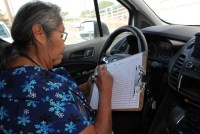Latest KFF Health News Stories
El cambio duplicará con creces el costo para los estudiantes. Expertos dicen que aumentará la escasez de estos profesionales de salud.
Amid Medicaid ‘Unwinding,’ Many States Wind Up Expanding
The end of pandemic-era Medicaid coverage protections coincided with changes in more than a dozen states to expand coverage for lower-income people, including children, pregnant women, and the incarcerated.
The Nation’s 911 System Is on the Brink of Its Own Emergency
911 outages have hit at least eight states this year. They’re emblematic of problems plaguing emergency response communications due in part to wide disparities in capabilities and funding.
El sistema de emergencias del 911 está al borde del colapso
Mientras que algunos estados, ciudades y condados ya han modernizado sus sistemas de emergencia del 911 o han hecho planes para actualizarlos, muchos otros están rezagados.
Colorado Dropped Medicaid Enrollees as Red States Have, Alarming Advocates for the Poor
Colorado defended its high disenrollment rates following the covid crisis by saying that what goes up must come down. Advocates and researchers disagree.
Colorado expulsó a beneficiarios de Medicaid como si fuera un estado republicano
Es el único estado demócrata entre un grupo de estados republicanos con altas tasas de desafiliación, que incluye a Idaho, Montana, Texas y Utah, en un proceso de Medicaid que comenzó en la primavera de 2023.
Republicans Are Downplaying Abortion, but It Keeps Coming Up
Torn between a base that wants more restrictions on reproductive health care and a moderate majority that does not, it seems many Republicans would rather take an off-ramp than a victory lap when it comes to abortion. But they can’t escape talking about it.
Sign Here? Financial Agreements May Leave Doctors in the Driver’s Seat
Agreeing to an out-of-network doctor’s own financial policy — which generally protects their ability to get paid and may be littered with confusing insurance and legal jargon — can create a binding contract that leaves a patient owing.
Ten Doctors on FDA Panel Reviewing Abbott Heart Device Had Financial Ties With Company
Most of the doctors the FDA tapped to advise it on an Abbott medical device had financial ties to the company. The FDA didn’t disclose the payments.
As money flows to abortion rights initiatives in states, some donors focus on where anger over the “Dobbs” ruling could propel voter turnout and spur Democratic victories up and down the ballot, including in key Senate races and the White House.
Hoping to Clear the Air in Casinos, Workers Seek to Ban Tobacco Smoke
Casinos in several states are fighting efforts to ban smoking, and trying to roll back existing anti-smoking laws. One planned facility even moved outside a city’s limits because of voter-approved smoking restrictions.
Deep Flaws in FDA Oversight of Medical Devices, and Patient Harm, Exposed in Lawsuits and Records
Thousands of medical devices are sold, and even implanted, with no safety tests.
Tiny, Rural Hospitals Feel the Pinch as Medicare Advantage Plans Grow
More than half of seniors are enrolled in private Medicare Advantage plans instead of traditional Medicare. Rural enrollment has increased fourfold and many small-town hospitals say that threatens their viability.
Feds Try to Head Off Growing Problem of Overdoses Among Expectant Mothers
Homicides, suicides, and drug overdoses have driven rising rates of pregnancy-related death in the U.S. This fall, six states received federal funding for substance use treatment interventions to prevent at least some of those deaths.
Con cambios en Medicaid, residentes de zonas rurales se sienten abandonados a su suerte
En las zonas rurales, la falta de acceso a navegadores, las personas que ayudan a los beneficiarios de Medicaid a mantener su cobertura o encontrar otro seguro si ya no reúnen los requisitos, podría agravar estas dificultades.
How Will Rural Americans Fare During Medicaid Unwinding? Experts Fear They’re on Their Own
As states review their Medicaid rolls after the expiration of a pandemic-era prohibition against kicking recipients off the government insurance program, experts say the lack of help available to rural Americans in navigating insurance options puts them at greater risk of losing health coverage than people in metropolitan areas.
No existen normas federales para proteger a los trabajadores cuando los días son excesivamente calurosos. Y sin el apoyo bipartidista del Congreso, incluso con la atención urgente de la administración Biden, es posible que el alivio no llegue en años.
Workers Pay the Price While Congress and Employers Debate Need for Heat Regulations
Studies suggest official numbers vastly underestimate heat-related injuries and illness on the job. To institute protections, the government must calculate their cost — and the cost of inaction.
Tribal Health Workers Aren’t Paid Like Their Peers. See Why Nevada Changed That.
Community health workers, who often help patients get to their appointments and pick up prescriptions for them, have increasingly been recognized as an integral part of treating chronic illnesses. But state-run Medicaid programs don’t always reimburse them equally, usually excluding those who work on tribal lands.
Journalists Explore Shortage of Foster Care Sites and Prevalence of Covid Misinformation
KFF Health News and California Healthline staff made the rounds on national and local media this week to discuss their stories. Here’s a collection of their appearances.






















